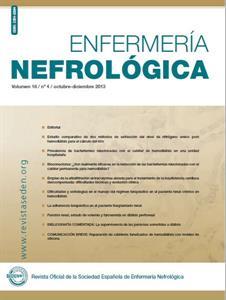Contenido del artículo principal
Resumen
Uno de los mayores problemas que presentan los catéteres venosos centrales tunelizados para hemodiálisis son las infecciones, por su gravedad y los elevados costes que generan. Por ello, es importante su prevención, ya que, además, el número de catéteres ha aumentado considerablemente en los últimos años.
Objetivos: Realizamos este estudio en nuestra unidad para analizar:
• Eficacia de unos conectores con sistema cerrado (TEGO®) en la prevención de bacteriemia relacionada con el catéter.
• Incidencia de Staphylococcus aureus y gérmenes causantes más frecuentes.
Material y método: Se realizó un estudio retrospectivo, comparativo y transversal durante 800 días, que dividimos en dos periodos iguales. En los primeros 400 se aplicó el protocolo de la unidad a 24 pacientes y en los 400 días siguientes se aplicó el mismo protocolo más los conectores anteriormente citados a 25. En ambos periodos, 19 fueron los mismos pacientes.
Resultados: En el primer periodo se contabilizaron 4 infecciones en 7062 días de catéter y en el segundo 2 infecciones en 8622 días de catéter.
Índice de bacteriemia en ambos periodos: 0,56/1000 y 0,23/1000 respectivamente.
Ninguna infección se produjo por Staphylococcus aureus, siendo el germen más frecuente Staphylococcus coagulasa negativo.
Conclusión: Nuestra conclusión es que los conectores fueron eficaces en la prevención de las bacteriemias ya que redujeron notablemente nuestros, ya bajos, índices de las mismas.
Objetivos: Realizamos este estudio en nuestra unidad para analizar:
• Eficacia de unos conectores con sistema cerrado (TEGO®) en la prevención de bacteriemia relacionada con el catéter.
• Incidencia de Staphylococcus aureus y gérmenes causantes más frecuentes.
Material y método: Se realizó un estudio retrospectivo, comparativo y transversal durante 800 días, que dividimos en dos periodos iguales. En los primeros 400 se aplicó el protocolo de la unidad a 24 pacientes y en los 400 días siguientes se aplicó el mismo protocolo más los conectores anteriormente citados a 25. En ambos periodos, 19 fueron los mismos pacientes.
Resultados: En el primer periodo se contabilizaron 4 infecciones en 7062 días de catéter y en el segundo 2 infecciones en 8622 días de catéter.
Índice de bacteriemia en ambos periodos: 0,56/1000 y 0,23/1000 respectivamente.
Ninguna infección se produjo por Staphylococcus aureus, siendo el germen más frecuente Staphylococcus coagulasa negativo.
Conclusión: Nuestra conclusión es que los conectores fueron eficaces en la prevención de las bacteriemias ya que redujeron notablemente nuestros, ya bajos, índices de las mismas.
Palabras clave
Catéter venoso central tunelizado; bacteriemia; bioconectores; hemodiálisis.
Detalles del artículo
Licencia
Aviso de derechos de autor/a
© Los autores ceden de forma no exclusiva los derechos de explotación de los trabajos publicados y consiente en que su uso y distribución se realice con la Licencia Creative Commons Atribución - No comercial 4.0 Internacional (CC BY-NC 4.0). Puede consultar desde aquí la versión informativa y el texto legal de la licencia. Esta circunstancia ha de hacerse constar expresamente de esta forma cuando sea necesario.
Cómo citar
1.
Crehuet Rodríguez I, Bernárdez-Lemus MA, Ramírez Crehuet M, Méndez Briso-Montiano P, Ruiz-Zorrilla López C. Bioconectores: ¿Son realmente eficaces en la reducción de las bacteriemias relacionadas con el catéter permanente para hemodiálisis?. Enferm Nefrol [Internet]. 2014 [consultado 13 Dic 2025];16(4):[aprox. 6 p.]. Disponible en: https://www.enfermerianefrologica.com/revista/article/view/4173




